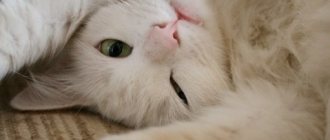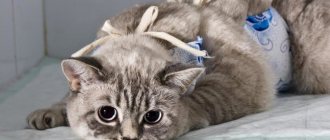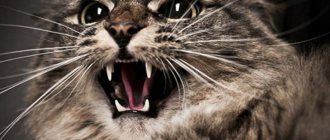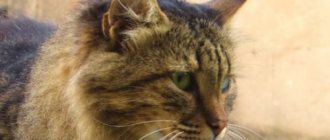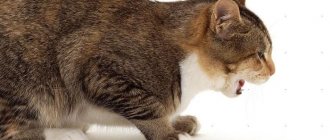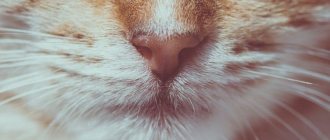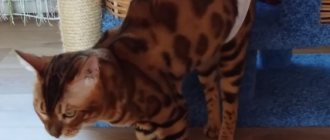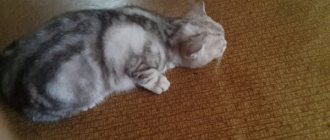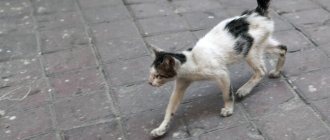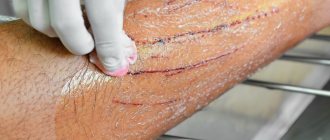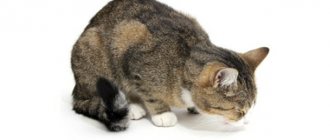Meeting a hiccupping cat is very rare, since this phenomenon is not very common for our four-legged pets. In addition, it can easily be confused with attempts to cough up fur or gagging. Attacks of hiccups can be completely painless for the cat and pass without a trace, or they can be accompanied by other alarming symptoms, which are important to pay attention to in time. Why a cat hiccups and how to help him get rid of a tiring attack will be discussed below.
The cat hiccups
A little physiology
Hiccups, both human and feline, are a rather mysterious phenomenon. It is known that attacks of hiccups are usually associated with mechanical irritation of the vagus nerve. Passing through the chest, diaphragm and peritoneum, this nerve is closely adjacent to the esophagus.
Bouts of hiccups occur in animals that chew their food poorly.
Once a cat has a bad experience with food or swallows too large a piece, the consequences will not be long in coming. The pulsating activity of this nerve will be the result of such a physiological phenomenon as hiccups. Contractions of the nerve will be attempts to get rid of the load that the animal brought by eating too large a piece.
To relieve pressure from the vagus nerve, you must do one of the following:
- Stretch.
- Inhale and hold your breath. With the help of inhalation, the animal straightens the diaphragm, pushing it down.
- Drink some water.
Unfortunately, sometimes water does not soothe, but provokes hiccups
The animal can perform all these actions independently if it wishes. The owner's support and care are not required in this matter.
Video - Hiccups in a kitten
Natural and unhealthy hiccups - what's the difference?
There are natural and unhealthy hiccups - what's the difference between them? The causes of “healthy” hiccups have already been listed above, and therefore it is time to list the factors leading to the development of pathological hiccups:
- Hiccups often develop in animals suffering from neurological diseases. It happens, for example, that a kitten with encephalitis is additionally shaken by attacks of hiccups.
- Serious intoxication, including helminthic nature. In addition, pets suffering from kidney disease (the latter also lead to intoxication) sometimes suffer from hiccups.
- Increased intracranial pressure.
- Diseases of the gastrointestinal tract. For example, with gastritis, the vagus nerve can be constantly irritated, causing the kitten to suffer from chronic, incessant hiccups.
Types of hiccups
It would seem that such a phenomenon as hiccups should have an exclusively physiological nature, but even here everything is not so simple. Hiccups can also contain an element of psychosomatization and be a reaction to a change in relationship with the owner. Sometimes the causes of hiccups remain unknown due to its fleeting nature.
Table 1. Types of hiccups
| Variety | Description |
| Idiopathic | Idiopathic hiccups are a kind of infantile inheritance, sometimes making themselves felt in adulthood. It cannot be predicted, and it leaves as suddenly as it comes. This type of hiccup is not accompanied by other painful manifestations and subsides within a few minutes after the onset. |
| Psychogenic | Hiccups caused by mental conditions are most often associated with a change in the usual environment, severe fear of the animal or prolonged stress. Also, attacks of hiccups can affect animals that have to fight for food resources in the house. To get rid of such hiccups, you should identify the source of the cat’s psychological discomfort. |
| Physiological | The pressure exerted on the vagus nerve by improper food intake also leads to prolonged bouts of hiccups. Excessive haste while eating, uncomfortable posture that distorts the esophagus, lack of water - all this sooner or later leads to painful hiccups. In addition to food, hairballs that get stuck in the gastrointestinal tract and interfere with normal digestion of food can also irritate the vagus nerve. |
| Pathological | Hiccups are sometimes the first innocent sign of serious illness. Its distinctive feature is its duration - the animal does not stop searching for ten minutes or more, experiencing discomfort. Only a veterinarian can determine the disease that causes hiccups, since the range of possible pathologies is quite large. It includes diseases from encephalitis to parasitic infestation |
Why
There may be several reasons, and now we will analyze them in detail.
The cat overate
Responsibility for dosing the food always lies with the owner, since he is the one responsible for the food. Pets often like to eat all the food left in the bowl.
Therefore, never refill it after emptying it.
It's best to set aside specific hours to fill your bowl. In this case, the pet will eat in portions and will not overeat.
Binge eating
Empty bowl of water
If your pet has a lack of fluid in the body, hiccups may indicate this. This is dangerous because a lack of water can lead to serious digestive disorders and constipation.
Always fill the bowl with water.
Don't forget to wash it, as some cats simply refuse to drink water from a dirty bowl.
Eats food too quickly
For this reason, hiccups may also appear. Even veterinarians cannot understand the exact reason for this phenomenon. But veterinarians know for sure that eating quickly is not the norm for cats, so eating quickly has a negative impact on the gastrointestinal tract.
Wool in the esophagus
Some of the wool gets into the stomach and dissolves, but not all of it. And the hair can form into clumps, which further provoke hiccups. Try to brush your pet regularly, and then a huge amount of fur from your fluffy will not get into the stomach.
Wool in the esophagus
In pregnant cats
Occurs regularly in pregnant cats; this is due to the fact that the stomach and diaphragm are displaced. This is why the vagus nerve is irritated, resulting in hiccups. It lasts from 1 minute to half an hour.
Inconvenient bowl
If you changed your cat's bowl and after that she started hiccupping, then you can immediately understand what's wrong. Pets usually eat in one position, and the esophagus is usually fine. But if the bowl is much higher than the previous one, then the esophagus is stretched, and this irritates the vagus nerve.
Intrauterine hiccups
The phenomenon of intrauterine hiccups requires special consideration. For the first time, kittens encounter it, respectively, in the womb. Before birth, hiccups perform a critical function - it allows kittens to use the diaphragm and make their first attempts to “breathe.” Of course, at this moment the kittens are not yet capable of independent breathing, but such hiccups already signal that even if born prematurely, the cubs will be able to survive.
Kittens are first introduced to hiccups while still in the womb.
A cat also feels the “hiccups” of her cubs, since they appear quite late and represent fetal twitching, visible even to the naked eye. Lung expansion is an important milestone that unborn kittens pass through and marks their readiness to live independently.
Kitten hiccups after eating
Hiccups often develop after eating. There are two reasons in this case:
- The swollen stomach compresses the diaphragm and branches of the vagus nerve.
- The pet, while eating greedily and quickly, “caught” air.
In more rare cases, attacks may develop after the kitten eats low-quality dry food. Such food can greatly irritate the stomach, which leads to hiccups. However, in most cases it is not recommended to feed kittens “drying” at all, especially economy class. This will almost certainly lead to problems with the entire gastrointestinal tract in the future.
Causes of hiccups in newborn kittens
The causes of hiccups in newborn kittens most often fall into the category of physiological and not dangerous. It's all about the physiology of young pets:
- The lungs of newborn kittens do not expand immediately; sometimes this process takes up to three days (atelectasis of newborns).
- Sometimes this process is “slow,” and therefore hiccups develop as an auxiliary mechanism. With strong contractions of the diaphragm, the lungs are “churned” and filled with air much faster.
What to do if your cat hiccups
When a cat's hiccups occur rarely and go away quickly, no special measures are needed to treat them. The animal must be calmed, petted, tried to give it water to drink, enticed into play and warmed up if the cat has been in the cold for a long time.
To prevent hiccups from appearing after eating, you need to monitor the temperature of food and water. It is unacceptable that they are too cold. Pieces of food should be small. It is important that the cat eats calmly, without rushing. You can't overfeed her.
It happens that the animal begins to hiccup frequently during molting. When licking, hairballs enter his esophagus, causing contractions of the diaphragm. During the molting period, you need to periodically comb your pet, especially if it has long hair.
If there are prolonged hiccups with difficulty breathing, vomiting, or signs of pain, the cat should be taken to the vet immediately. He will conduct an examination and prescribe a course of treatment. The hiccups will disappear as soon as the disease begins to subside. The main thing is to seek help from a specialist in time so that the pathology does not become too severe.
Causes
Both adults and babies can suffer from hiccups. Often a kitten experiences it in the womb, shortly before birth. It is believed that intrauterine hiccups are necessary for the formation of independent breathing and serve to train the diaphragm and respiratory muscles.
In most cases, hiccups for adults are completely harmless. In this case, it is usually episodic in nature and is an unconditioned reflex that occurs as a response to temporary discomfort in the gastrointestinal tract. After the normal state of the gastrointestinal tract is restored, spasms of the diaphragm also disappear.
But if a cat hiccups frequently and for a long time, this may indicate severe internal pathologies. Thus, depending on the causes and provoking factors, several types of hiccups are distinguished:
- idiopathic;
- psychogenic;
- arising as a result of stimulation of the diaphragm and irritation of the vagus nerve;
- pathological
Idiopathic hiccups
It has no apparent cause and goes away on its own. Doctors suggest that initially hiccups were a protective reaction of the body. Idiopathic hiccups are an incompletely extinguished reflex of intrauterine fetal hiccups, necessary for the kitten to learn to breathe on its own.
Psychogenic hiccups
Psychogenic hiccups occur if the pet is depressed or has experienced a nervous shock. The reasons for this may be the following:
- the animal suffers from lack of attention, no one plays with it;
- the cat remains locked alone if the owners are away from home for a long time;
- There is competition between animals for territory or food (if there are two or three cats in the house).
Hiccups caused by stimulation of the diaphragm and irritation of the vagus nerve
If a cat hiccups after eating, this means that its body is trying to restore the function of the pinched vagus nerve. The vagus nerve or vagus nerve is a paired nerve that runs throughout the body, from the head to the abdominal cavity. It innervates the head, neck, organs of the chest cavity, and gastrointestinal tract. Passing through the hole in the diaphragm, it regulates the functions of breathing, swallowing, heartbeat, vomiting, and stomach function.
Under the influence of many factors and as a result of stimulation of the diaphragm, the vagal nerve can be infringed. The mechanism of hiccups, which consists of a sharp contraction of the diaphragmatic muscles and subsequent release of tension, helps relieve the pinching and release it. Situations that contribute to nerve pinching lead to the appearance of hiccups:
- binge eating;
- hasty eating, poor chewing, swallowing food in large pieces;
- eating cold food or water;
- eating dry food in the absence of sufficient liquid;
- severe hypothermia of the animal;
- eating in an awkward position when the esophagus or stomach is bent;
- pregnancy, when an enlarged uterus can put pressure on the diaphragm;
- The molting period is also a provoking factor, since cats, while licking themselves, swallow a large amount of hair.
Pathological hiccups
Pathological hiccups are a symptom of a wide variety of diseases. If it is prolonged and is accompanied by other alarming symptoms, then the cat must be shown to a veterinarian. Otherwise, you may not notice that he is developing a serious illness and waste time. Pathological hiccups may indicate the following diseases:
- Disturbances in the functioning of the central nervous system. If a cat hiccups excessively, experiences nausea, or blurred vision, this may indicate inflammation of the meninges (meningitis, encephalitis) or high intracranial pressure. If coordination of movements is impaired or there is circular walking, then there is a high probability of tumor diseases of the brain.
- Diseases of the gastrointestinal tract. Prolonged, frequently recurring hiccups may indicate gastritis or stomach ulcers, pancreatitis, disease of the gallbladder and biliary tract.
- Diseases of the cardiovascular and respiratory systems. Hiccups can be a symptom of bronchitis, pneumonia, as well as heart attack, stroke or arrhythmia.
- Infectious diseases of various etiologies, helminthiasis. All viral and bacterial infections can cause intoxication of the body and be accompanied by nausea, vomiting or hiccups. Infections with any type of helminths also manifest themselves.
- Prolonged hiccups can be a kind of reflex action. This happens when a foreign body (for example, a fish bone) is stuck in the esophagus and the cat is trying to do everything to free itself from it. In this case, other symptoms are present (difficulty in swallowing and breathing, cough, lacrimation, pain). You should immediately contact a veterinarian, as delay can be life-threatening for the animal.
- An allergic reaction affecting the mucous membrane of the respiratory tract can cause prolonged hiccups, sneezing, coughing, difficulty breathing, suffocation, and others.
How to help a cat
A hiccupping cat gets nervous, begins to rush around the house, and suddenly changes its position. To help quickly cope with the attack, she needs to be calmed down. Play with your favorite pet and cuddle it. Offer a new toy. Play is always a good option, especially for a small kitten. A sudden change in activity with a change in breathing rhythm helps eliminate the problem.
Try giving your cat clean, lukewarm water. But you can’t scare people, as people are advised to do (when frightened, a hiccupping person takes a frantic breath of air and soon everything goes away). On the contrary, try to provide him with complete peace. On the contrary, try to provide him with complete peace. Show affectionate care. The pet will be distracted and calm down. Breathing will return to normal. This will help you overcome hiccups faster.
